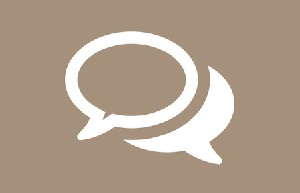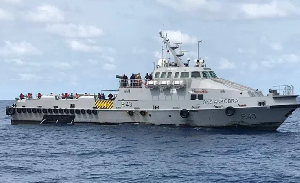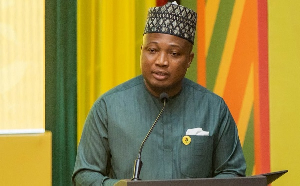Ghana may soon start importing water! I can almost hear the entire nation shout, “God forbid!” Cannot blame anybody for thus reacting; as a matter of fact, I did no less until the bare facts were presented to me. That was when I realised that the shout was actually only a wish. I wished the facts were wrong.
Dr Joseph Ampofo, the Director of the Water Research Institute of the Council for Scientific and Industrial Research (CSIR-WRI), and his team, however, are not wrong. The calamity Ghanaians are about to visit upon ourselves is the consequence of our inability, over the years, to curb the pollution and siltation of our water bodies.
Nonetheless, hear Dr Ampofo: “The next crisis to hit this nation after the ‘Dumsor’ is the water crisis.”
What is Ghana’s sin?
As I write, the Pra River is almost beyond redemption, destroyed by galamsey. Koforidua cannot use the Densu River. It has been so polluted that the only way Ghana Water Company Limited (GWCL) can supply water to the Eastern Regional capital and surroundings is for it to pump water from Kpong.
Every Ghanaian above 20 remembers the water crisis that hit Cape Coast and its surroundings in the late 1990s. So grave was the crisis that the traditional priests attributed it to the anger of the gods who, they said, needed to be pacified with some sheep and drinks. The regional minister at the time refused to provide the animals and drinks.
In 2004, I was among a team that accompanied the then Minister of Water Resources Works and Housing to inaugurate the dredging of the Brimsu Dam in the Central Region. No sooner had the dredging been completed than the Cape Coast water crisis ended. It had been the result of years of siltation, a purely human problem!
The Birim River has been declared “not drinkable”. Indeed, the extent of pollution is so serious that it cannot even be used to water seedlings in nurseries!
The White Volta River got its name, many years ago, because the water was so clean and so clear that from the top one could see the sand very white at the bottom of the river. Today, it is so muddy it no longer deserves that name — the “whiteness” is gone — polluted, almost past salvation.
“Our last hope was the Volta River, but now they (“Galamsey” operators) have put their equipment on it,” remarks Dr Ampofo. Speaking in tones (not very much unlike a prophet’s), he warns: “A time is coming — and it looks like sooner than we had anticipated — when we (Ghanaians) shall see water but we cannot use it.”
The Arithmetic is what got to me. “What is the price of one gallon of petrol today?” he asks. “Compare that to the price of the small 0.5 litre bottled water.” What it means is that in a few years from now, Ghanaians would be paying as much for water as for petrol!
Galamsey operators
Only a few years ago, there was some hope that something could be done about Ghana’s situation. Today, thanks to “galamsey” operators and their greed for gold, that hope is fading – almost gone. They are killing all our water bodies with poisonous chemicals.
“So why are we not stopping them?” demands Dr Ampofo. “Why are we not jailing them, seizing or destroying their equipment?” The WRI director is unable to hide his suspicion. “There can be only one reason: the people who have the power to destroy their equipment and arrest the ‘galamsey’ operators are the very faceless people behind the illegal mining operations. Unfortunately, while government officials and the rich in the cities can afford bottled water from shopping malls, the poor cannot.”
Poor farming practices
In addition to “galamsey” activities and the associated pollution, there is also the issue of bad farming activities along river banks in Ghana. Farming close to or in river channels is resulting in rapid sedimentation of river channels and reservoirs. These lead to low water storage volumes and consequential flooding of farms and settlements. There is, therefore, the urgent need to enforce buffer zone limits along streams and rivers in Ghana.
Climate change is a stark reality everywhere. The CSIR-WRI projects that the consequential impact of this on river flows will lead to 20-40 per cent reduction in river water flows in Ghana.
I confess that even as I devote this week’s column to sound the warning, I have no illusions about the reaction it will receive — silence. The Government will do nothing. This is the tragedy of the Ghanaian story: advice and warnings do not frighten Ghanaians. Only disasters do — like what happened at Kwame Nkrumah Circle on June 3, 2015.
How do we ‘legally obtain evidence’ in a bribery case?
President Kufuor was right. “Bring me the proof,” he insisted to those accusing his government of doing nothing to minimise corruption. How Atta Mills and his spokespersons, then in opposition, harangued him! Then Atta Mills came to power. From the Boom Junction, Jerry Rawlings led the chorus, demanding to see “corrupt NPP functionaries” thrown into jail. But it was not that Atta Mills loved the NPP functionaries: fact was, “the evidence against them cannot stand up in court,” he said (not in so many words).
How can two mutual beneficiaries of a crime expose each other? Aside from using subterfuge and spy-book techniques (as is used to bust powerful drug barons), how can anyone hope to catch the bribe giver and taker in the very act? So how else can anyone “legally obtain” evidence to prove a case of bribery?
For me, the issues are simple. One: Are the images in the Anas video those of the judges? Two: Were they seen taking money? Three: Is it established that the money was taken to pervert justice?
Opinions of Friday, 18 September 2015
Columnist: Enimil Ashon















